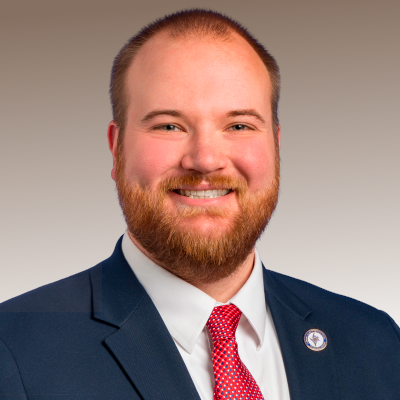Legislative Update: Hensley, Capley share top bills on the Hill
Editor's Note: Sen. Joey Hensley, R-Hohenwald, and Rep. Kip Capley, R-Summertown, share information about the top bills discussed in the 113th General Assembly each week.

Hensley report
Legislation advances to crack down on TikTok use at Tennessee College Campuses
The Senate Education Committee unanimously approved legislation to prohibit the Chinese-owned social media platforms TikTok and WeChat from being accessed on Tennessee public higher education institutions’ internet networks. These platforms pose serious national security risks to the United States.
National security experts have warned that TikTok has the potential to allow the Chinese Communist Party to spy on Americans’ activities and control their mobile devices. We have to take every precaution possible to minimize the threat of TikTok. The State of Tennessee and the Federal government have taken similar steps to mitigate the security risks of TikTok by prohibiting government internet networks and devices from supporting the social media app.
Expanding eligibility for the Tennessee HOPE scholarship - Senate Bill 74 seeks to recruit, retain and reward eligible Tennessee HOPE scholarship students by allowing them to receive the HOPE scholarship until the student has earned an advanced degree or for up to five years from initial enrollment, whichever is first. The HOPE scholarship is funded by the state lottery and is awarded to freshmen who are enrolled at an eligible postsecondary institution within 16 months after graduating from a Tennessee-eligible high school.
Removing the tuition cap for dual enrollment - The Education Committee this week passed a bill that removes the tuition cap for dual enrollment for certain campuses. Senate bill 1408 applies to high school students taking college courses to get a head start for college credit. Present law prohibits an eligible postsecondary institution from charging certain students receiving a dual enrollment grant tuition or fees in excess of the student’s dual enrollment grant award. However, an eligible postsecondary institution may charge a student receiving a dual enrollment grant costs actually incurred by the institution on the student's behalf, including book and material costs, and special examination fee. This bill changes the prohibition above to only apply to eligible public postsecondary institutions, not independent postsecondary institutions.
Easing requirements for veterans seeking a commercial driver’s license - Passed by the Transportation and Safety committee, Senate Bill 105 waives the knowledge test for active military service members, veterans and national guardsmen applying for a commercial driver’s license (CDL). The bill identifies various alternative requirements for the license, including operating a commercial motor vehicle in the military in combination with a good driving record. Similar laws are in place in 18 other states, including South Carolina, Georgia and Texas.
Restitution for children of victims of DUI - In the event a parent of a minor child is killed by an intoxicated driver, current law requires the convicted offender to pay restitution to each of the victim’s children until each child reaches 18 years of age and has graduated from high school or the class of which the child is a member has graduated. Senate Bill 442, is known as “Dillard’s Law” and amends current law by allowing a family to convert the criminal restitution, which would be paid at the end of the defendant’s sentence, to a civil judgment, allowing the children to be compensated sooner rather than later.
Annual Hospital Assessment Act – The Senate Health and Welfare Committee passed legislation to extend the Annual Hospital Assessment Act, which the state has passed each year since 2010. Senate Bill 289 continues the voluntary hospital assessment that results in more than $691 million in state funds going towards covering indigent and uninsured care provided by hospitals to the general public and makes the state eligible for $1.8 billion in federal matching funds to support TennCare. This assessment identifies areas of needs for hospitals and helps hospitals meet these needs and continue operations while not raising prices for patients.
Topical Medical Waste Reduction Act of 2023 – Legislation passed the Health and Welfare Committee to allow patients to take home topical medication administered at a hospital or surgical center that is needed for continued use. Senate Bill 523 will save patients money and reduce waste for medication currently tossed out after being opened at a healthcare facility. The legislation applies to topical antibiotics, anti-inflammatory, dilation, glaucoma drops or ointments.

Capley report
The pace picked up this week on Capitol Hill with lawmakers advancing several bills through committee and on the House floor.
The House Finance, Ways and Means Committee continued its work advancing the priorities of Tennesseans for next year by completing its seventh week of budget hearings. The House Education Committee on Wednesday held a special hearing to consider testimony from Tennessee teachers, superintendents and other experts on childhood literacy rates in Tennessee. Much of the focus was on the impact of the bipartisan Tennessee Literary Success Act and Learning Loss Remediation and Student Acceleration Act passed by the General Assembly in early 2021. The laws were aimed at improving literacy rates and tackling the learning loss related to COVID-19.
Before the pandemic, only a third of Tennessee fourth graders were able to read at grade level. Republicans in the Tennessee General Assembly have placed a heightened focus on foundational literacy skills in recent years because of the critical importance of third-grade reading proficiency.
The third-grade retention law passed in 2021 provides students with additional academic support before being promoted to the fourth grade if they are not reading on-level. Lawmakers this session have filed 18 bills to address concerns about the law. The House K-12 Education Subcommittee will begin to consider the proposals in a special hearing scheduled for March 7.
General Assembly bans changing gender identity in children - Legislation that prohibits minors from undergoing irreversible and harmful medical procedures for the purpose of changing their gender identity now heads to the governor’s desk for his signature, following a 77-16 vote in the House chamber on Thursday.
Tennessee now provides the nation’s strongest protections against the removal of a child’s healthy body parts. House Bill 1 sponsored by House Majority Leader William Lamberth, R-Portland, bans medical interference that alters a child’s hormonal balance and procedures that remove body parts to enable the minor to identify as a gender different from their biological sex. The Senate version passed on Feb. 13. Any health care provider who violates the law can be sued in civil court by the minor injured, the parent of the minor injured or the Attorney General within 30 years of the violation. Providers found to be in violation could face up to a $25,000 penalty per violation and have their medical license restricted.
The legislation ensures that doctors can still prescribe hormone treatment to minors for medically necessary purposes and makes exceptions for children born with chromosomal anomalies or congenital defects. House Bill 1 now heads to the governor’s desk to be signed into law. It becomes effective July 1.
Constitutional carry expansion advances - Republican legislation to expand protections for Tennesseans’ Second Amendment rights advanced out of the House Civil Justice Subcommittee this week.
House Bill 1005, as amended, would expand constitutional carry in Tennessee by allowing law-abiding adults to carry a firearm where they are legally allowed to. The legislation would also lower the minimum age required for a person to obtain an enhanced, lifetime enhanced or concealed handgun carry permit from 21 to 18 years of age. If approved, the bill would also rename concealed handgun carry permits and enhanced handgun carry permits to concealed firearm carry permits and enhanced firearm carry permits. Permit holders and law-abiding adults would be allowed to carry any firearm they legally own in any place or manner currently authorized for handguns.
Existing state law prohibiting certain individuals, like those convicted of stalking, from possessing a firearm would remain unchanged. Additionally, the legislation would clarify that a person or entity who prohibits the possession of firearms on their property is not immune from civil liability. House Bill 1005 is scheduled to be heard in the House Civil Justice Committee on March 1.
General Assembly protects children from adult entertainment - The House chamber on Thursday passed legislation that protects children from being exposed to sexually explicit performances. House Bill 9, sponsored by State Rep. Chris Todd, R-Jackson, restricts adult-oriented cabaret performances from being performed on public property if children could be present.
The bill requires private establishments such as bars or restaurants that host sexually explicit shows to require patrons to show identification to ensure they are at least 18. The bill provides common-sense protection and clarity regarding what performances are not appropriate for children.
A violation of this bill would result in a Class A misdemeanor, and a second or subsequent offense would result in a Class E felony. The bill returns to the Senate chamber for a procedural vote before heading to the governor’s desk for his signature. Another proposal making its way through House committees would require a person to obtain a valid entertainer permit from the adult-oriented establishment board in jurisdictions with a board, prior to performing an adult cabaret entertainment show.
House Bill 30, sponsored by State Rep. Clay Doggett, R-Pulaski, prohibits public, private and commercial establishments from allowing anyone under the age of 18 to attend such a performance. House Bill 30 is scheduled to be heard in the House Finance, Ways, and Means Committee on Feb. 28.
Information submitted by Sen. Joey Hensley, R-Hohenwald, and Rep. Kip Capley, R-Summertown.
This article originally appeared on The Daily Herald: Legislative Update: Hensley, Capley share top bills on the Hill
